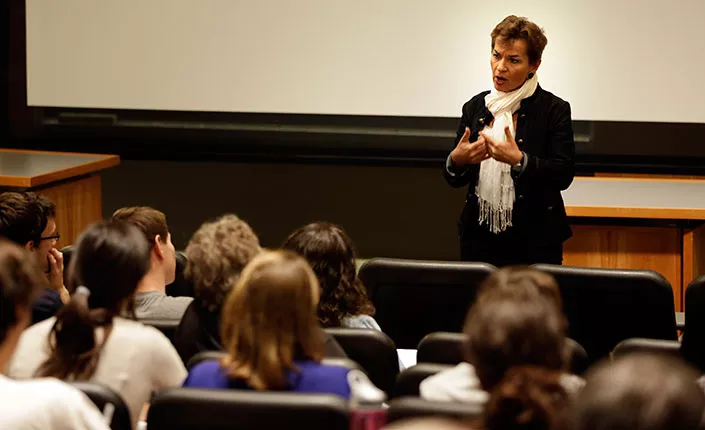UN Climate Chief Christiana Figueres '79 Fights to Reduce Global Emissions

Christiana Figueres '79 spoke with students about the anthropology of climate change during a campus visit in 2012.
The New Yorker: The Weight of the World
The United Nations Framework Convention on Climate Change, or U.N.F.C.C.C., has by now been ratified by 195 countries, which, depending on how you count, represents either all the countries in the world or all the countries and then some. Every year, the treaty stipulates, the signatories have to hold a meeting—a gathering that’s known as a COP, short for Conference of the Parties. The third COP produced the Kyoto Protocol, which, in turn, gave rise to another mandatory gathering, a MOP, or Meeting of the Parties. The 17th COP, which coincided with the seventh MOP, took place in South Africa. There it was decided that the work of previous COPs and MOPs had been inadequate, and a new group was formed—the Ad Hoc Working Group on the Durban Platform for Enhanced Action, usually referred to as the A.D.P. The A.D.P. subsequently split into A.D.P.-1 and A.D.P.-2, each of which held meetings of its own. The purpose of the U.N.F.C.C.C. and of the many negotiating sessions and working groups and protocols it has spun off over the years is to prevent “dangerous anthropogenic interference with the climate system.” In climate circles, this is usually shortened to D.A.I. In plain English, it means global collapse.
The Framework Convention on Climate Change is overseen by an organization known as the Secretariat, which is led by a Costa Rican named Christiana Figueres ['79]. Figueres is five feet tall, with short brown hair and strikingly different-colored eyes—one blue and one hazel. In contrast to most diplomats, who cultivate an air of professional reserve, Figueres is emotive to the point of disarming—“a mini-volcano” is how one of her aides described her to me. She laughs frequently—a hearty, ha-ha-ha chortle—and weeps almost as often. “I walk around with Kleenex,” another aide told me.
Figueres, who is 59, is an avid runner—the first time I met her, she was hobbling around with blisters acquired from a half marathon—and an uninhibited dancer. Last fall, when her office was preparing for the 20th COP, which was held in Lima, she and some of her assistants secretly practiced a routine set to Beyoncé’s “Move Your Body.” At a meeting of the Secretariat staff, which numbers more than 500, they ripped off their jackets and started to jump, jump, jump.
Figueres works out of a spacious office in Bonn, in a building that used to belong to the German parliament. On the wall by her desk there’s a framed motto that reads, “Impossible is not a fact, it is an attitude.” On another wall there’s a poster showing the Statue of Liberty waist-high in water, and on a third a black-and-white photograph of Figueres’s father, José, who led the Costa Rican revolution of 1948. He served as President of the country three times, pushed through sweeping political and social reforms, and abolished Costa Rica’s army as a stay against dictatorship. Figueres grew up partly in the President’s House and partly on her father’s farm, which he called La Lucha sin Fin—“the struggle without end.”
“I’m very comfortable with the word ‘revolution,’ ” Figueres told me. “In my experience, revolutions have been very positive.”
Of all the jobs in the world, Figueres’s may possess the very highest ratio of responsibility (preventing global collapse) to authority (practically none). The role entails convincing 195 countries—many of which rely on selling fossil fuels for their national income and almost all of which depend on burning them for the bulk of their energy—that giving up such fuels is a good idea. When Figueres took over the Secretariat, in 2010, there were lots of people who thought the job so thankless that it ought to be abolished. This was in the aftermath of the 15th COP, held in Copenhagen, which had been expected to yield a historic agreement but ended in anger and recrimination.
Figueres and her team have spent the years since Copenhagen trying to learn from its mistakes. How well they have done so will become apparent three months from now, when world leaders meet for this year’s COP—the 21st—in Paris. Like Copenhagen, Paris is being billed as a historic event—“our last hope,” in the words of Fatih Birol, the incoming director of the International Energy Agency—and, again, expectations are running high. “We are duty-bound to succeed,” France’s President, François Hollande, has declared.
The danger of high expectations, of course, is that they can be all the more devastatingly dashed. Figueres, who is well aware of this, is doing her best to raise them further, on the theory that the best way to make something happen is to convince people that it is going to happen. “I have not met a single human being who’s motivated by bad news,” she told me. “Not a single human being.”
Read the full article at The New Yorker.
Christiana Figueres '79 is the executive secretary of the United Nations Framework Convention on Climate Change. In addition to her B.A. in anthropology from Swarthmore, Figueres holds a master's degree in social anthropology from the London School of Economics and a certificate in organizational development from Georgetown University. She is also the founder of the non-profit Center for Sustainable Development of the Americas and received the Hero for the Planet award from National Geographic in 2001. Listen to her 2012 campus talk, The Anthropology of Climate Change.



